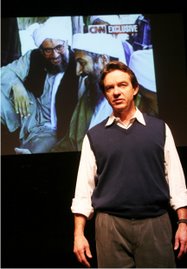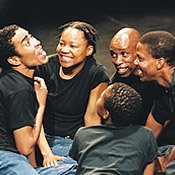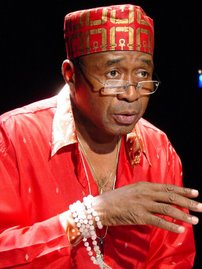Corin Redgrave reads "They Fight For Peace," by a poet who's name I can't type quickly or accurately enough.
Very short, abstract, powerful poem.
Lynn Redgrave takes the stage and reads a short history of the poet's life. The poet, Ameer, a Saudi, was detained because he worked in Afghanistan for a charity. He is a leader at Gitmo. Just after a Grievance Commission was formed, the government disbanded it, put Ameer in solitary confinement, and is shipping him off to Saudi Arabia, where he will be held in a secret prison and almost certainly killed.
***
Abdul Aziz, last name withheld, from Riyadh, S.A., wrote "O Prison Darkness."
"We love the darkness
For after the dark hours of the night, pride will rise.
...
We know, God has a design.
...
The morning is about to break forth."
He also wrote, "I Shall Not Complain," an exhortation to Allah (always translated God, I suppose to make it more marketable?) to grant him patience; he will complain to none but God.
***
Jemma Redgrave speaks of a poet named Dossari, who has tried to kill himself twelve times, sometimes via multiple methods at once. He appears in Inside the Wire.
Jemma R. reads "Death Poem," a very strong work asking everyone to watch the poet die ("at the hands of the protectors of peace"). (See an earlier post for full text.)
***
Lynn R. speaks of Dost (sp? all of these sp?), an author of many, many books, a known poet and scholar. He was released, wrote a book detailing his detention at Gitmo, and was then re-arrested by Pakistani officials. He as not been heard from since.
A poem asking why he is deprived of the love of his father. "I," the poet syas, "continue to beat with life... I know a greater freedom."
Cup Poem #1
What kind of spring is this
where there are no flowers
and the air is filled with a miserable smell?
"They Cannot Help"
"Consider what might compel a man to kill himself, or another?"
***
Jemma R. reads of a young man who was hung by his wrists and beaten by the Pakistanis. He was overjoyed to be handed to the U.S. He was stripped and beaten by the U.S., too. He was one of the first round of "enemy combatants."
"This Is My Life," I think is the name of the first poem. It details what happened to him: He came to Pakistan (from Chad) to pursue an education (to learn about information technology and English). He was arrested leaving a mosque; he was not allowed to use the bathroom during a sixteen-hour trip to prison. "We saw such insults from them." The prisoners were beaten and insulted, kept drunk and rich (by the Americans?). "They carried us afterwards to Cuba, because it is an afflicted isle. Their war is against Islam, and justice."
Talk about bad P.R. I mean, if Bush's regime beats up every captured Muslim, of course the other non-captured Muslims are going to hate Bush (and thus you and me - he's our leader).
***
Corin R. loudly reads of a man "Humiliated in the Shackles," writing a letter in his head to his son as he listens to the birds outside his cell, alive, free. He is offered money and land and freedom if he betrays "other" al-Qaeda members. "America - you ride on the backs of orphans and terrorize them daily," Corin/the poet yell. He directs his grievances to Allah and asks his son to be strong, though he himself is humiliated. "How can I write? My soul is like a roiling sea. I am captive, but the crimes are my captors'."
(One feels these poems are going to take on a perhaps unwelcome degree of similarity as they concatenate...)
***
Vanessa R. reads of a man who lost both his legs due to American bombings, not even at the same time. He has been forced to walk at Gitmo on prosthetic limbs held together with duct-tape.
"To My Father"
"Two years have passed in faraway prisons
Two years my eyes untouched by cold" [or kohl?]
Forced confession, defense of honor that needs no apology. Deal-making - "if all Arabs were to sell their faith, I would not sell mine."
***
Corin R. reads of Hassan, a prolific poet taken in Pakistan while studying at a university. He remains at Gitmo, though the U.S. government does not allege that he has participated in any violence whatsoever.
"The Truth"
Inscribe your letters in laurel trees
from the cave all the way to the city of the Chosen
...
Are these lights that I see real?
The Devil leads them (Americans) around in the darkness; they have exchanged piety for cheap commodity. Will you get up and question events?
Illusions soar all around...
(The blog itself necessarily grows more poetic as the scraps well up from Corin's majestic voice - I recommend readers watch the performances on Blip [thanks to the Kunstlers and crew] tomorrow.
These poems are somewhat insular and melodramatic, moreso than other Arabic poems I've read. They are almost all addressed to Allah and speak in vague terms of justice and injustice. Some of this rally-speak is very powerful; the shorter poems, in particular, stick to specifics and turn very clear arguments against the logic of torture - with chilling, image-driven specifics. Their sadness is overwhelming and infectious.)
***
Lynn R. reads about Kabir, a poet detained primarily because he was caught wearing a Casio watch, a brand favored by terrorists (according to the U.S. government?). His poem, "Is It True?," asks if the grass still grows, if he will ever leave prison and see his wife and children again.
***
Jemma R. reads of a Yemeni, Mohammed, a religious teacher. He saw a Qur'an being thrown into a barrel of human waste in prison. "I Am Sorry, My Brother."
***
Corin R. reads of Akhmed, a man who studied at a college in the U.S. and went home after a bad break-up. He was detained, help for years in Guantánamo, then released, November, 2005.
"My Heart Was Wounded By The Strangeness"
Do not blame the poet who comes to your land inspired, arranging rhymes
...
O brother... If you blame yourself, my poem will appease you
...
I will offer advice from pure cordiality.
A quiet poem of fatalistic but not unhappy acceptance, an exhortation to be generous, to forgive. The poem's great power comes from its dwelling on separation (from the brother), not on the daily horrors of imprisonment (though that route works in so many other of these poems).
***
Vanessa R. reads of Ibrahim, a religious scholar and candidate for judgeship who was captured and sold to the United States. When asked why he should be released, he replid: "In the world of international courts, the person is innocent until proven guilty. Why, here, is the person guilty until proven innocent?" His poem asks a lot about Cuba, how Cuba could help the U.S. "What have you gained?" Poetry...
(Here I break to post...)
Subscribe to:
Post Comments (Atom)




No comments:
Post a Comment